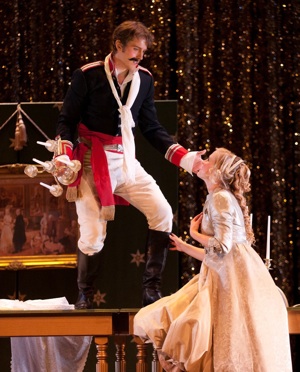
The delightful Merolini
Now in its 54th year, the Merola Opera Program continues to bring new opera talent to the Bay Area to be trained in vocal and performance technique. This year over 800 young artists applied for the program’s 25 slots, which include 20 singers, four apprentice vocal coaches, and one apprentice stage director. The finalists were singers from as far away as Inner Mongolia, China, and as near by as Orinda.
For Bay Area audiences the benefits of the Merola program have always been delightful. Three performances during the summer months: two of which are concert selections of favorite arias and scenes; the third is a full-blown performance of an opera. This year the Merola singers performed Rossini’s ebullient “Il barbiere di Siviglia.”
You can hardly ask for a better choice: the opera is zany, seething with the foibles and passions of youth (including its mockery of the old and avaricious) and rife with pleasingly melodic vocal gymnastics.
The opera was double-cast and the opening performance saw Suzanne Rigden as Rosina, Heath Huberg as Count Almaviva, and Jonathon Michie as the redoubtable Figaro. Rigden has a vivid and flexible soprano of considerable size, and she flung her way into those upper upper register notes with the ease of an aerialist born to fly. In mid register her voice offered a youthful sweetness. Heath Huberg has a lovely tenor, just the voice of a heartthrob. He had the misfortune to start off a bit sharp, but was able to regain the center of the pitch and relax into the role of the amorous and devious Almaviva. His handsome portrayal had a gentility that added to the charm of the character.
Jonathon Michie got to sing the role that everyone (including animators) loves: Figaro, the sly opportunist who overcomes the stringencies of an unfair class system through bravado and genius intuition. Michie has a big, round, wonderful voice, which he handles with panache and a physical bounce that gives him charisma onstage.
Big voices ruled the day in this production. With everyone capable of being heard in the next county, possibly the next state.
Phillipe Sly sang Doctor Bartolo and his companion in greed Don Basilio was performed by Adam Lau. Endowed with rich baritone and bass voices, these two also showed comic brilliance, slouching their way through misfiring plotting and connivance. Deborah Nansteel and Suchan Kim partook of that same screwball energy in their performances of the Doctor’s alcoholically replete and inefficient servants.
The production didn’t quite stand up to the level of the singers, however. The glittery Christmas curtain sets, such as they were, gave the stage lots of light, a needed accessory to the Herbst Theater stage, which always gives a feeling of darkness to its performances, but otherwise seemed anomalous. And the raising and lowering of the front glittery curtain seemed an awkward and ad hoc solution to scene changes. The costumes were terrific, especially the huge wigs.
It seems that the Merola program has suffered a diminution of its resources in the past years. It has gone from producing two operas—one repertory and one contemporary—per summer. And this year’s production was less extensive and original in its physical presentation. It’s a pity. These singers and this program deserve the best possible support from their community.
It would be splendid if the program also nurtured new opera composers and librettists. Something like the Jerwood Opera Writing Program that is part of the Aldeburgh Music center in the UK seems needed. But these are hard times. We may have to wait a long time for that one.
—Jaime Robles
Photo: Suzanne Rigden as Rosina and Heath Huberg as Count Almaviva.
